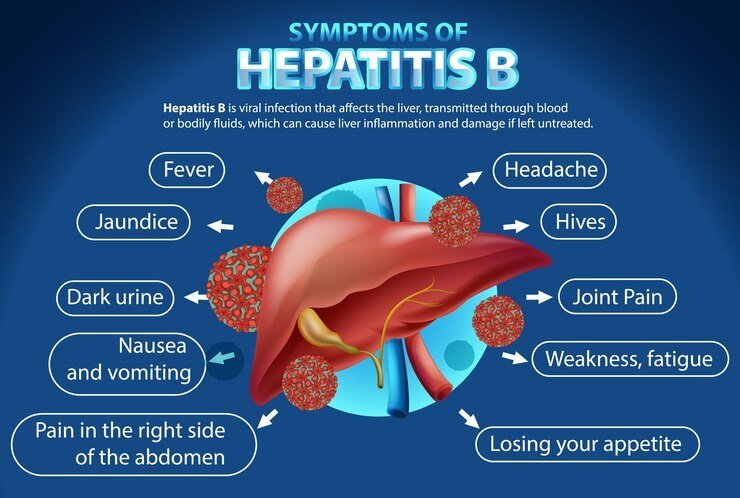The hepatitis B virus is the source of B type hepatitis, a liver infection. Both acute (short-lived and severe) and chronic (long-lived) infections are possible.
People with B hepatitis have a higher chance of dying from liver cancer and cirrhosis, as well as a chronic infection.
Contact with contaminated bodily fluids, such as blood, saliva, vaginal secretions, and semen, can spread the infection. Additionally, a mother might pass it on to her child.
I. Hepatitis B vaccine
All newborns and children up to the age of eighteen are advised to receive the safe and effective hepatitis B vaccine. Adults with diabetes and those at high risk of infection because of their occupations, lifestyles, places of residence, or nationality should also get the hepatitis vaccine. All adults should give the vaccination considerable thought in order to obtain lifetime protection against a preventable chronic liver disease, as everyone is at some risk.
Because it prevents HBV, the world’s top cause of liver cancer, that vaccination is frequently referred to as the first “anti-cancer” vaccine.
II. Hepatitis B symptoms
Among the warning signs and symptoms of HB include:
. stomach ache
. Dark urine
. Fiver
. Pain in the joints
. Appetite decline
. Vomiting as well as nausea
. Weariness and weakness
Jaundice is the medical term for yellowing of the skin and whites of the eyes.
III. Hepatitis B surface antibody
A successful this hepatitis vaccination recipient also develops anti-HBs. Anti-HBs levels in vaccine responders who finished a series of vaccinations may decrease with time, but most remain immune and will mount a defense when exposed to HBV.
IV. Hepatitis B vaccine schedule
Three-Dose Hepatitis Vaccine Schedule
First Shot: Newborns should receive this dose in the birth room, although it can be given at any time.
Second Shot: At least 28 days (or one month) following the first shot.
Third Shot: At least 16 weeks or 4 months following the first shot and 2 months following the second shot.
V. Hepatitis B treatment
Chronic B type hepatitis infection treatment
. Antiviral drugs. Entecavir (Baraclude), tenofovir (Viread), lamivudine (Epivir), adefovir (Hepsera), and telbivudine are a few antiviral medications that can assist in combating the virus and reducing its capacity to harm your liver.
. Injections of interferon
. Liver transplant
VI. Hepatitis B transmission
When blood, semen, or other bodily fluids from an infected individual enter the body of an uninfected person, that type hepatitis can spread. Sexual contact, sharing syringes, needles, or other injectable supplies, as well as pregnancy or childbirth, can all lead to this.
VII. Hepatitis B surface antigen
The proteins known as antigens on the surface of HBV trigger the production of antibodies by your immune system. Your blood may include hepatitis B surface antigens a few weeks after the infection first manifests. They represent one of the first indications of an infection with HB.
B Hepatitis surface antigens can be detected during a chronic, or long-term, infection and are an early indicator of an acute infection.
VIII. Hepatitis B causes
When blood, semen, or other bodily fluids from an infected individual enter the body of an uninfected person, that hepatitis can spread. Sexual contact, sharing syringes, needles, or other injectable supplies, as well as pregnancy or childbirth, can all lead to this.
IX. Hepatitis B surf ab quant
Best outcome: between 9.9 and 100 mIU/ml. Now interpret the outcomes of your laboratory work. When someone has HBV infection, the presence of an antibody to the hepatitis B surface antigen (anti-HBs) is used to assess their immunological status and track the disease’s course.
X. Hepatitis B symptoms in women
Early signs and symptoms can include weakness, appetite loss, fever, aches in the muscles and joints, nausea, vomiting, and sometimes yellow skin. Your body may occasionally be unable to eliminate the illness. If so, you have long-term, chronic HBV. It is possible that you have few, if any, symptoms at all.
XI. Hepatitis B virus
The HB virus is the source of hepatitis B, a liver infection. Both acute (short-lived and severe) and chronic (long-lived) infections are possible. People with B hepatitis have a higher chance of dying from liver cancer and cirrhosis, as well as a chronic infection.
XII. Hepatitis B surface antibody reactive
B Hepatitis surface antibody, or anti-HBs (HBsAb): A “positive” or “reactive” anti-HBs (or HBsAb) test result signifies protection from the HB virus. Either getting the hepatitis B vaccine or effectively overcoming a previous HB infection can result in this protection.
XIII. Hepatitis B medication
The following treatments are possible for chronic HBV: antiviral drugs. The ability of the virus to harm your liver can be slowed down by taking various antiviral medications, such as entecavir (Baraclude), tenofovir (Viread), lamivudine (Epivir), adefovir (Hepsera), and telbivudine.
XIV. Hepatitis B prevention
Immunization is the best defense against B hepatitis. Additional strategies to lower your chance of contracting HIV, hepatitis B, and hepatitis C: Avoid injecting drugs. Give stop injecting narcotics and check yourself into a treatment center. Never share needles, syringes, water, or “works” if you are unable to stop.
XV. Hepatitis B titer
A hepatitis B titer test analyzes blood antibodies to determine whether a vaccination or prior illness has rendered you immune. The viral infection known as HBV affects your liver.
Patient Diet and Guidelines:
| Guidelines | Recommended Diet |
|---|---|
| – Follow prescribed medication regimen | – Consume plenty of fruits and vegetables |
| – Get vaccinated if not already | – Incorporate lean proteins like fish and tofu |
| – Avoid alcohol and tobacco | – Limit intake of fatty and processed foods |
| – Practice good hygiene to prevent infection | – Drink plenty of water to stay hydrated |
| – Get regular check-ups and screenings | – Avoid raw or undercooked foods |
| – Rest and avoid excessive physical exertion | – Opt for whole grains and legumes |



